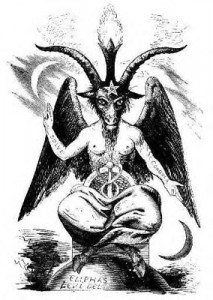Is Freemasonry an Occult Practice?
The question above is a tier two question. It isn’t a topic that is given as a charge in the degrees of Freemasonry, but rather seems to come up in the broader connectivity of the craft to other systems. Its in these secondary connections that most confront and work with as they start to put the fraternity into a historical context of understanding.
Before we can adequately talk about this though, it may be necessary to define what occult means. In contemporary society, the term occult is an immediate watch word for Satanism, or the study by some nefarious cult. The pejorative aspect if it’s meaning, derived to give credence to the user’s opinion, brands it with only one aspect of its meaning.
The definition of the occult does not relate to Freemasonry per-se, but we find that it is in the study of the obscure and less obvious that we can link meaning and practice. Specifically in the study of things hidden or shut off from view. Often we rely on the term “esoteric” to be less socially offensive.
Read: Baphomet – Symbols and Symbolism
But I question if esoteric is really an accurate definition for what the study entails.
In my opinion, the esoteric idea is a broad one that encompasses much by way of subjects not often spoken of. Whereas, the word occult is a particular area of study, an area or topic out of the mainstream because it encapsulates an area of study that was at one time found to be counterintuitive to the acceptable line of thought.
Perhaps this is still the case.
I raised this same discussion in a forum that I frequent and from it came two interesting results. The first throught was:
As broad and diverse that the practice of Freemasonry encompasses, that there was nothing prohibitive to the study of the Occult to the Freemason, but that the requirement of its study was not linked to the craft.
Simply that the two are not linked except in the interest of study by the student.
The second idea said:
Confusion arises when the study of the subject becomes its practice. In this instance the study of the occult in Freemasonry becoming the practice of the fraternity in its day to day operation.
Where I see this come full circle is that the question is still overshadowed in how others perceive the work. Do we shirk away when the accusation is made that we study occulted topics, or can we affirm the work that we do, despite the proposers insinuation of what is “acceptable”?
More still, do our minds immediately go to the negative meaning of the word occult when someone asks us if it is a part of our study?
Is it acceptable in Freemasonry to be open about the study of the occult? Is the occult a negative word?
Is there a better word to define the study that Freemasonry embarks in?


https://www.youtube.com/watch?v=fwnSE4-enUI
it more organized than He thinks! they are all joined together by a unholy baptism. Barbra Marx Hubbard and David Spengler explains, as does Benjamin Cream and Helena Blavatski to name very few. they New it was a unholy baptism of the antichrist spiritual captivity Revelation13:10. Shhhh its a secret!!! Those who go into captivity into captivity you shall go.